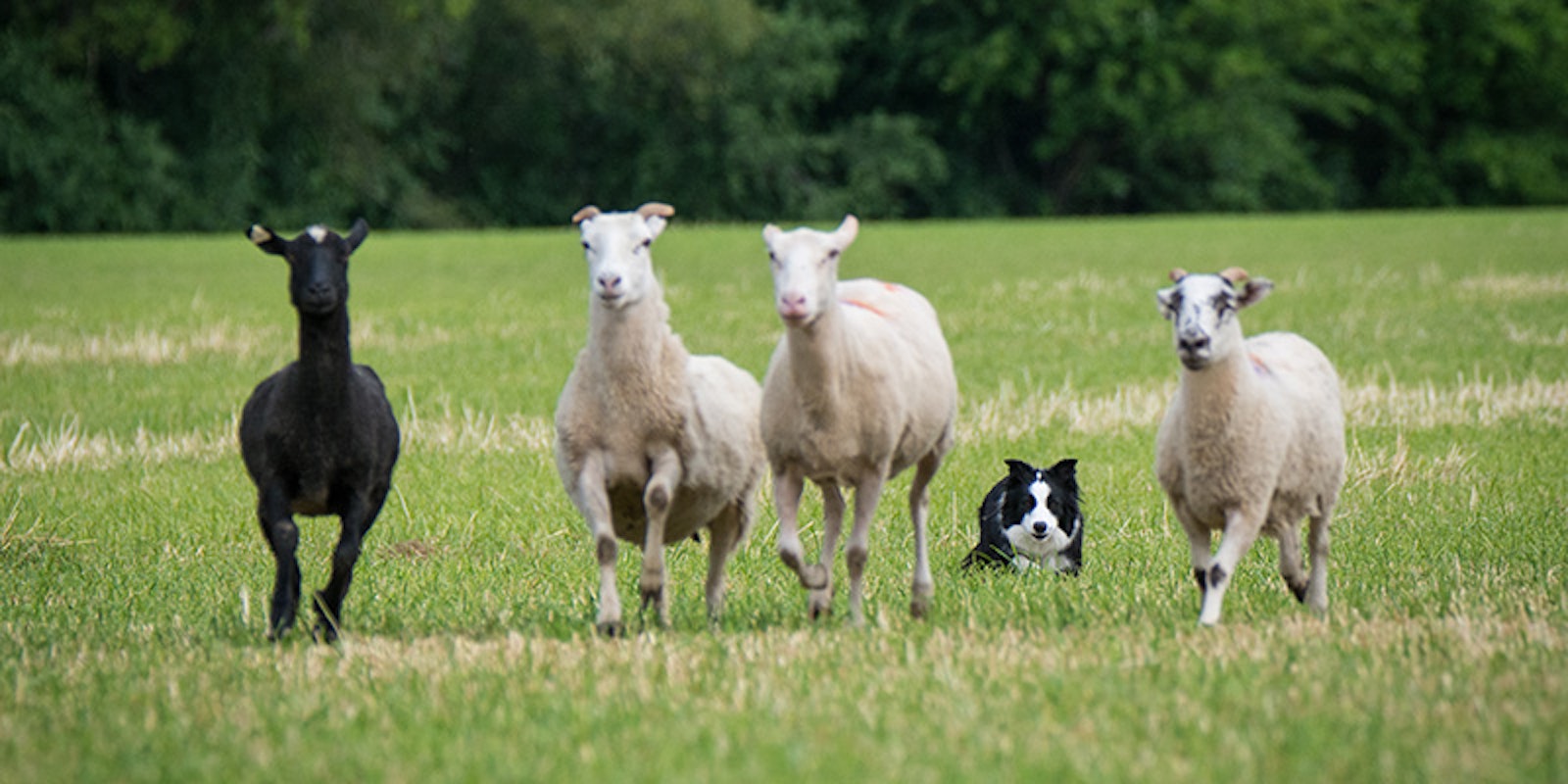Fiber festivals are always wonderful fun—I’ve yet to visit a fiber festival and think to myself, “Well that was a waste of my time!” No matter what’s on the schedule—or in the vendor area—I always manage to have a delightful time (and leave with an armful of yarn and other goodies). There is one fiber festival event I love more than any other, one that if it’s on the schedule I will plan my whole visit around: the sheep dog demonstrations. I love to see working dogs in action and I am never disappointed. For anyone else with a similar inclination, every year the Crook and Whistle Stock Dog Trial is held at the Wisconsin Sheep and Wool Festival. Last year, our own Elizabeth Prose learned all about the event from cofounder John Wentz. Here’s their conversation. —Christina
Has a black-and-white dog streaking across a field ever caught your eye at a fiber festival? Have you noticed a handful of sheep clump and move together, heard a series of whistles, and seen the laser-like focus of a pair of brown eyes? The Sheep Dog Trial (SDT) showcases the skills that a dog and handler use every day while caring for a flock of sheep.
We asked John Wentz, cofounder of the Crook and Whistle SDT held at the Wisconsin Sheep and Wool Festival, to share a bit about the event and the benefits of using a dog to help handle sheep. Assisted by border collies for twenty years, John says using dogs has made a world of difference in managing his flock. “When I didn’t have dogs, I worried all the time about sheep getting out and how I would get basic things like the deworming and vaccinating done. I was never sure if I would be able to corral them when I wanted; the grain pail was my only tool. I did have a pretty flighty breed of sheep—Border Cheviots. Now that I have good dogs, I can take and put my sheep anywhere I want at the time of my choosing.”
Crouching dog herding sheep.
John explains that the SDTs are held in three classes: Novice, Pro-Novice, and Open. The Novice class exhibits the minimum abilities required of a beginner handler and dog to gather the sheep and put them in a pen.
The Pro-Novice class demonstrates the talent of a dog-and-handler team with more experience. The sheep are set out a couple hundred yards from the handler and dog. Guided with whistles and voice commands from the handler, the dog pushes the sheep in a controlled fashion through a set of gates to the handler’s feet. The dog drives the sheep through a course over a hundred yards or more around a post and through a series of gates while moving the sheep toward and away from the handler, ultimately closing them in a pen.
The Open class is a much larger version of the Pro-Novice class. The distance can exceed 400 yards, the drive is longer, and dogs are challenged with the additional task of shedding, where one or more sheep are separated from the flock with the dog maintaining control.
The best way to obtain a quality sheepherding dog is to observe its parents; they are the best indicator of how a pup will perform. John also recommends doing your homework: Internet research, books, videos, and clinics are great resources. John thinks dogs are an “underutilized resource.” He explains, “I think most farmers that try it don’t give it enough time to work out, or they start out with a not-so-good dog. Once you get it to work, there is no looking back. The fear changes to ‘Oh, my God! What if something happens to the dog?’”
When asked if there is anything in particular he likes the most about sheepherding with a dog, John reflects, “I like being that guy standing on top of the hill watching my sheep graze, and it’s just me, the dog, and a crook and whistle.”
Be sure to check out the Sheep Dog Trial (SDT) for a change of (ahem) pace from classes and shopping. For other delights from a sheep and wool festival, check out Three Bags Full.
The 2018 Crook and Whistle Stock Dog Trial will be held at the Wisconsin Sheep and Wool Festival September 7–9, 2018 (Friday through Sunday) in Jefferson, Wisconsin. To learn more, visit www.wisconsinsheepandwoolfestival.com.
—Elizabeth Prose
Updated August 14, 2018.


